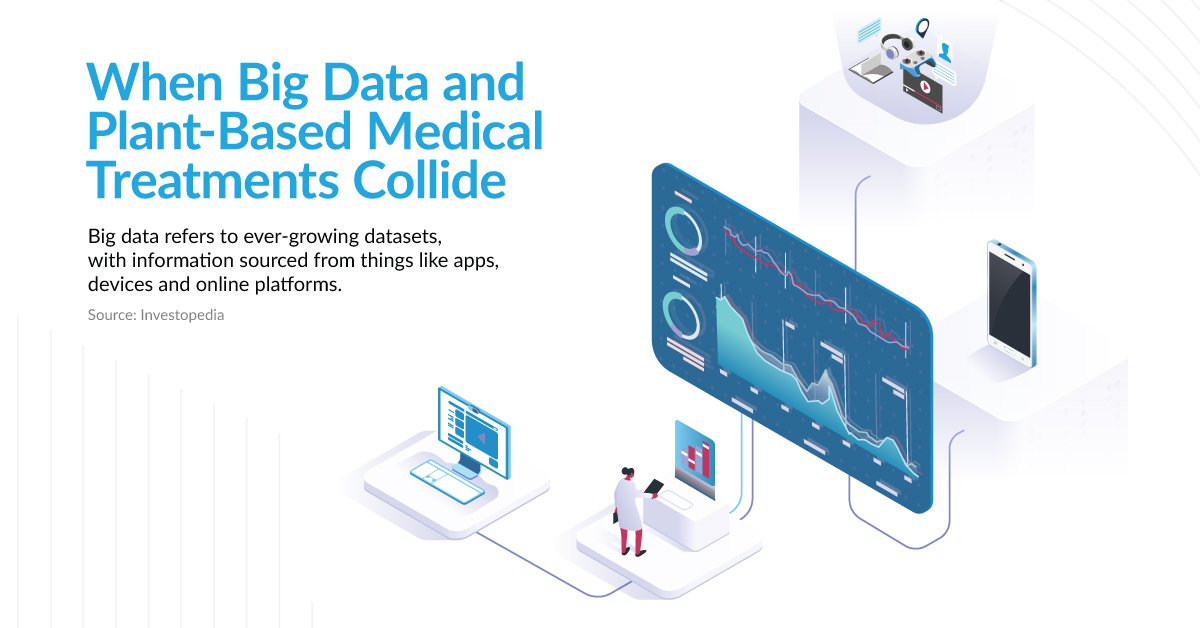When Big Data and Plant-Based Medical Treatments Collide
The following content is sponsored by RYAH MedTech

When Big Data and Plant-Based Medical Treatments Collide
Plant-based medical treatments are gaining popularity, as consumers become increasingly more privy to their various health benefits.
By 2030, the global botanical and plant-derived drug market is expected to reach $37.8 billion, at a compound annual growth rate (CAGR) of 3.5%.
Yet, while its future looks promising, the industry still some roadblocks to overcome. This graphic by RYAH MedTech looks at the key issues the plant-based medical industry is facing, and how big data can help solve them.
Key Industry Roadblocks
Plant-based treatments—such as medical cannabis—have come a long way in recent years. However, inconsistencies in regulation and dosage are making it hard for the industry to reach its full potential.
- Inconsistent regulation
Access to medical cannabis is still not equal across America, but legalization is becoming increasingly more widespread. For instance, Kansas passed a bill earlier this year that will legalize medical cannabis, as soon as the legislation is passed through the Senate. - Inconsistent dosage standards
While consumers have expressed a desire for standardized dosing, there is no current jurisdiction to guide consumption. For example, studies have shown a lack of genetic consistency among different products that claim to use the same strain. - Knowledge gap
Many physicians see the value in plant-based treatments, but some still don’t feel comfortable talking to patients about it. A recent survey found that 50% of Michigan-based healthcare respondents—where medical cannabis has been legal since 2008—didn’t feel comfortable answering patient questions about medical cannabis.
In order to overcome these challenges, the industry needs to fill the knowledge gap and ultimately boost credibility.
For this to happen, plant-based treatments need to become more predictable and standardized. And that’s where big data and analytics can help.
Big Data’s Big Role in the Industry
Big data refers to large datasets that continually grow. These datasets are made up of information that is sourced from things like apps, devices, and online platforms. The need to leverage data in the plant-based medicine industry has resulted in an explosion of innovation.
RYAH MedTech collects massive amounts of patient data through devices such as smart inhalers, pens, and patches. These devices track, synthesize, and analyze patient information, which can help create a more personalized treatment plan tailored to the patient and their specific needs.
In addition to helping boost the patient’s experience, big data also has the potential to fill the knowledge gap within the plant-based medical industry and give physicians the information they need, which could boost its overall credibility.
Data is the Answer
Plant-based medical treatments have vast potential—so much so, that adjacent industries are taking measures to protect their market share.
But the industry needs to become more standardized before it can level up. This is why companies like RYAH MedTech are helping to close the gap in missing data, through a suite of IoT devices and software.
-

 Sponsored3 years ago
Sponsored3 years agoMore Than Precious: Silver’s Role in the New Energy Era (Part 3 of 3)
Long known as a precious metal, silver in solar and EV technologies will redefine its role and importance to a greener economy.
-

 Sponsored7 years ago
Sponsored7 years agoThe History and Evolution of the Video Games Market
Everything from Pong to the rise of mobile gaming and AR/VR. Learn about the $100 billion video games market in this giant infographic.
-

 Sponsored8 years ago
Sponsored8 years agoThe Extraordinary Raw Materials in an iPhone 6s
Over 700 million iPhones have now been sold, but the iPhone would not exist if it were not for the raw materials that make the technology...
-

 Sponsored8 years ago
Sponsored8 years agoThe Industrial Internet, and How It’s Revolutionizing Mining
The convergence of the global industrial sector with big data and the internet of things, or the Industrial Internet, will revolutionize how mining works.


